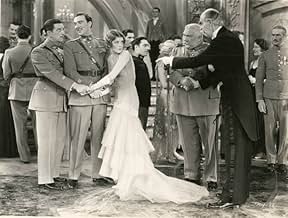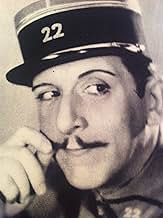Füge eine Handlung in deiner Sprache hinzuA Legionnaire in love with an aspiring opera singer is expected to marry the general's daughter, who in turn is in love with another soldier.A Legionnaire in love with an aspiring opera singer is expected to marry the general's daughter, who in turn is in love with another soldier.A Legionnaire in love with an aspiring opera singer is expected to marry the general's daughter, who in turn is in love with another soldier.
- Regie
- Drehbuch
- Hauptbesetzung
- Auszeichnungen
- 1 wins total
- Bellini's Theatrical Manager
- (Nicht genannt)
- Cafe Manager
- (Nicht genannt)
- Gino - Orchestra Leader in Cafe
- (Nicht genannt)
- Cafe Waiter
- (Nicht genannt)
- Specialty Dancer
- (Nicht genannt)
- Specialty Dancer
- (Nicht genannt)
- M. Bachegalupé
- (Nicht genannt)
- Milan Opera Fan
- (Nicht genannt)
- Reception Guest
- (Nicht genannt)
Empfohlene Bewertungen
However, plot was never really the point of this early talkie operetta. The point was comedy and good tunes and good fun, and at that it succeeds quite well. Don't let any other possible bad experiences with early talkie musicals deter you from watching this one - it's one of the best of the first generation of musicals. Even Claude Gillingham's talent at cinematic grouchiness is turned into an opportunity for a memorable song, and Edward Everett Hornton, with a song in his heart if not on his lips and underneath all of that ridiculous Technicolor makeup is still Edward Everett Hornton who is always uniquely hilarious as he verbally takes you through whatever predicament he happens to be in. As someone else mentioned, the singer of note here is Bernice Claire as Fifi who inexplicably disappeared from motion pictures in the early 30's. Her voice is right up there with Jeanette McDonald's.
The only bad thing I have to say is that because the Technicolor print is lost and only black and white remains, some of the scenes and shots do not make sense. In Technicolor no doubt the dance numbers and long shots of production numbers would have been a feast for the eyes with their oranges, pinks, blues, and greens. Since film choreography at this time is pretty much non-existent what remains are shots of dancing girls moving about rather slowly, no doubt so you could get a look at their costumes which in black and white are nothing to write home about.
Highly recommended for the early talkie musical enthusiast.
The musical numbers are OK, though sung in an operatic style that some may like, but most moviegoers now hate. The staging is very static. As for plot and acting -- nothing very good or very bad. Because Edward Everett Horton has a role outside of his usual range, he's subdued and seems a bit uncomfortable.
The bright spot here is Frank McHugh as the Brooklyn accented "Francois", who gets a comic number to himself in the opening reels. He shouts more than sings, but it's decent Broadway style singing. He also, in the same number, gets to parade about in drag. This is quite funny, and if you're in the right mood, worth seeing. His role, however, is entirely peripheral to the plot, and his speaking style is wackily out of place.
It was one of the last operettas made in the genre's first cycle, and too many musicals spoiled the box-office. But it's better-paced and less pretentious than most of its kind.
The film is supposedly about French folks, but you'll never hear anything close to resembling a French accent in the film. It's a film about a Legionnaire (Pidgeon) falling for a cabaret singer...and the father (Gillingwater) refusing to allow the marriage. As for Bernice Claire, she plays the woman...and her acting isn't bad but when she began singing my dog attempted suicide several times! Yes, her operatic style and the songs were just awful and you need to hear them to believe them!! My daughter also heard a few songs and said something like "Why are you torturing yourself with this movie?!"....and that pretty much sums it up. It's a movie with nice acting and a decent plot...but the singing is just horrible. This film is one of the reasons why after a plethora of musicals in the late 20s and early 30s, Hollywood stopped making so many for a few years until they realized the public did enjoy musicals...provided they didn't stink!
*While very, very few people would know his name, Gillingwater made a career out of playing old sour pusses...and he was great at it! He really was amazing playing such parts and here he's at his best.
Wusstest du schon
- WissenswertesAlthough originally released in 2-strip Technicolor, the film only survives in black and white. The narrower surviving sound on film version is apparently the sole source of today's television prints, resulting in a loss of image on the left hand side which becomes all too apparent in the lop-sided musical numbers and cropped newspaper headline inserts.
- PatzerA poster advertises the opera Carmen by Bellini. Carmen is actually by Bizet.
- Zitate
Mme. Cecile: [Finding her employee, Fifi, smooching with Legionnaire Paul] Fifi! So this is the way you waste your time - canoodling!
Paul de St. Cyr: [Paul and Fifi get up, looking guilty] Don't blame Fifi, madame. It's my fault.
Mme. Cecile: Don't tell me what to do, you... you canoodler! Come, Fifi.
- VerbindungenVersion of Mademoiselle Modiste (1926)
- SoundtracksClothes Parade
(1905) (uncredited)
Music by Victor Herbert
Lyrics by Henry Martyn Blossom
Sung and danced by a chorus at Cecile's Modiste's shop
Top-Auswahl
Details
- Erscheinungsdatum
- Herkunftsland
- Sprache
- Auch bekannt als
- Toast of the Legion
- Drehorte
- Produktionsfirma
- Weitere beteiligte Unternehmen bei IMDbPro anzeigen
- Laufzeit
- 1 Std. 15 Min.(75 min)

























